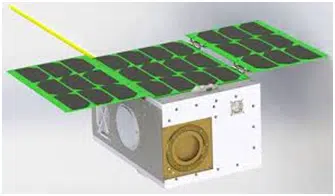INSPIREsat-1 satellite first Taiwan presence in ISRO
What is the news:
- The INSPIREsat-1 (IS-1) satellite, developed jointly by Taiwan, India, Singapore, and the United States, entered orbit on Valentine’s Day Monday after blasting off from India’s Satish Dhawan Space Center at 5:59 a.m. (8:29 a.m. Taiwan time)
- IS-1 was a part of two rideshare payloads aboard one of the Indian Space Research Organization’s (ISRO) Polar Satellite Launch Vehicles, whose main passenger was ISRO’s own radar imaging satellite.
- After leaving its carrier rocket, IS-1 began transmitting signals while orbiting above North America at 9:30 a.m. Taiwan time.
About INSPIREsat-1 (IS-1):
- IS-1 is a scientific cube satellite engineered under the International Satellite Program in Research and Education (INSPIRE), whose membership includes a consortium of colleges and universities with space science programs.
- The small satellite was developed jointly by Taiwan’s National Central University (NCU), India’s Indian Institute of Space Science and Technology (IIST), Singapore’s Nanyang Technological University, and the United State’s Laboratory for Atmospheric and Space Physics (LASP) at the University of Colorado at Boulder.
- The satellite is carrying two scientific instruments that its developers said would improve our understanding of ionosphere dynamics and the sun’s coronal heating process.

Important:
- Speaking with CNA on Monday, NCU professor and project leader Chang Chi-wei (revealed that the Taiwanese team had developed IS-1’s Compact Ionospheric Probe (CIP), while the satellite’s other instrument, the Dual-zone Aperture X-ray Solar Spectrometer, was developed by LASP with the support of NASA.
- The main function of NCU’s CIP is to “measure ionospheric ion concentrations, velocities, and temperatures to explore the terrestrial ionosphere,” Chang said, adding that the IS-1 was engineered to last for one year, with a mission life of six months.
- On Taiwan’s technological strength in engineering, Dr. Priyadarshnam Hari, who is Chang’s counterpart at IIST, said: “Taiwan has a good space science group and excellent electronics manufacturing industry. Rapid prototyping and flight model realizations of the designs are very important for progressing rapidly in which Taiwan’s industry can play a major role.”
- He added that universities in Taiwan and India could benefit from further space science collaboration.
- “Both Taiwan and India can work in the area of remote sensing and space science through student satellites, demonstrating technologies for the future, by combining their strengths,” he said, adding that the “regular exchange of students and faculty members can be used to improve both technical and cultural aspects.”
- Taiwan’s Ministry of Science and Technology (MOST) said that the Taiwanese government encouraged international academic collaboration to help improve the nation’s capabilities and contribute more to global scientific research and development.
- MOST added that with Taiwan’s current investments in space science, it was hoped that the country could become an important contributor to future space programs.
About Indian Space Research Organisation (ISRO):
- Headquartered in Bengaluru.
- Chairman – S. Somnath
- Formed – 15 August 1969
- The Indian Space Research Organisation is the national space agency of India
- It operates under the Department of Space (DOS) which is directly overseen by the Prime Minister of India, while Chairman of ISRO acts as executive of DOS as well.
Subscribe
0 Comments





